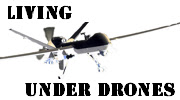A startling report has been released by Stanford University. It provides a comprehensive assessment on the impact of US drone strikes in northwestern Pakistan. Research teams spent time in the Federally Administered Tribal Areas (FATA) in February/March 2012 and in May 2012.
Two aspects of this report stand out for me. Firstly the detailed account of the impact of drone strikes on community life in the target areas. The report states that the presence of drones “... terrorizes men, women, and children, giving rise to anxiety and psychological trauma among civilian communities. Those living under drones have to face the constant worry that a deadly strike may be fired at any moment, and the knowledge that they are powerless to protect themselves. These fears have affected behaviour.”
Secondly evidence that a ‘double-tap’ tactic continues to be employed by the CIA whereby a second missile is fired a couple of minutes after the first killing those who have come to the aid of casualties. There are several testimonies to the effect that consequently after a drone strike people no longer rush to the rescue of those hit for fear of a second missile. A ‘double-tap’ is deplorable. It hardly needs stating that the targeting of rescuers constitutes a war crime under the Geneva Convention.
Our churches have publicly challenged the Foreign Secretary to distance the UK from the US drones strikes in Pakistan. We have written to the Foreign and Commonwealth Office and will be publishing the response when it arrives.
The Living Under Drones report illustrates that the capabilities provided by drone technology (e.g. persistent surveillance and track and kill capabilities) are currently running ahead of agreed ethical and legal constraints around the use of drones. The position of the UK military is that the Rules of Engagement that we apply to
the use of the RAF’s armed drones are identical to those that we would apply to fast jets and other forms of air power. But drones raise new questions for us and these need thorough consideration and debate.
[See also our Churches' report; Drones: Ethical Dilemmas in the Application of Military Force]

